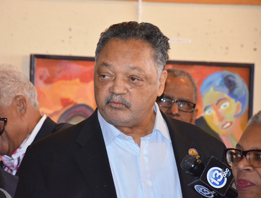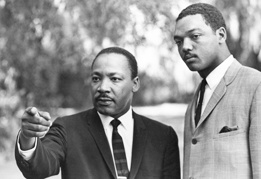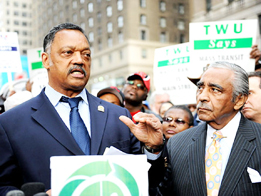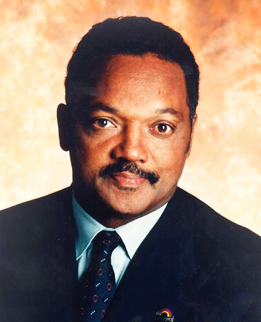|
A Black History Moment – Jesse Jackson in the 1980s
By Fletcher Word
Sojourner’s Truth Editor
Last week, we took a look
at some of the significant events of the 1970s and the
infancy of the post-Civil Rights era – the achievements of
athlete Hank Aaron and actor Cicely Tyson along with the
political successes of local and national elected officials.
Following those successes
in the 1980s the Rev. Jesse Jackson reached for another
level. He ran two campaigns for president, in 1984 and 1988,
and became the second Africa American to mount such an
effort. following Congresswoman Shirley Chisholm’s 1972
campaign.
Born in 1941 in
Greenville, South Carolina, Jackson would prove to be both
an accomplished scholar and athlete. Forsaking a minor
league baseball contract upon graduation from high school,
he entered the University of Illinois on a football
scholarship. After his second semester there, he transferred
to North Carolina AT&T, an HBCU, in order to play
quarterback and to participate on a competitive
public-speaking team.
During his college days,
Jackson joined the efforts of the Civil Rights movement –
sit-ins at the Greenville, South Carlina library, for
example. After college, he started working for Dr. Martin
Luther King, Jr. and took part in the Selma to Montgomery
marches, took a leading role in the Southern Christian
Leadership Conference which eventually led him to assuming
control of the Chicago branch of the SCLC economic program,
Operation Breadbasket, and to national director of that
program in 1967.
He founded Operation PUSH
in 1971 – and became increasingly active in efforts to
pressure large corporations to re-evaluate their hiring and
purchasing practices.
In 1984, Jackson started
the Rainbow Coalition which would eventually merge with
PUSH.
Jackson announced his
first run in November 1983 and political observers and
pundits immediately wrote off his chances. He was regarded
as a fringe candidate because he was Black and was far too
liberal for the American electorate, whose political
leanings are often characterized as being center-right.
|



 |
|
Nevertheless, Jackson did
unexpectedly well. He ended up with 18.2 percent of the
primary votes, finishing third behind the eventual
Democratic Party nominee former Vice President Walter
Mondale, and the runner up Senator Gary Hart.
Jackson actually won
caucuses and primaries in Louisiana, the District of
Columbia, South Carolina and Mississippi. He also garnered
the more votes in the Virginia primary than any other
candidate although he finished second in delegates behind
Mondale.
In 1988, Jackson was
poised for even greater success on the campaign trail – he
was better financed and better organized than he had been
four years earlier. He would double his 1984 results.
Jackson began the season
by winning the Michigan caucus with 55 percent of the votes
and was the front runner heading into Colarado but lost
there to Massachusetts Governor Michael Dukakis. He then
lost Wisconsin to Dukakis and never caught up again.
However, he ended up with a total of 6.9 million primary and
caucus votes and won 11 contests – Alabama, the District of
Columbus, Georgia, Louisiana, Mississippi, Puerto Rico,
Virginia, Delaware, Michigan, South Carolina and Vermont. He
also did well in Alaska and Texas.
Jackson’s liberal platform
included such items as: creating a Works Progress
Administration to rebuild infrastructure, scaling down the
War on Drugs, eliminating Reagan tax cuts, cutting defense
spending, sanction South Africa as a apartheid nation,
declaring a nuclear freeze, re-instituting Roosevelt-era New
Deal farms programs, creating a single-payer universal
health care system, ratifying the Equal Rights Amendment,
increasing federal funding for public education, enforcing
the Voting Rights Act and supporting formation of a
Palestinian state.
With the exception of the
South Africa sanctions issue, none of Jackson’s proposals
made it into the Democratic Party platform in either 1984 or
1988 but virtually all are still pushed by the progressive
wing of the Party and Jackson’s political influence has not
waned over the years.
|